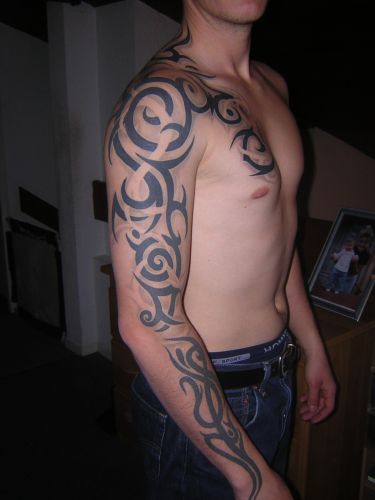.JPG)
While
tribal tattooing has a history as far back as tattooing itself, these
types of images have gained a huge increase in general popularity,
beginning in the early 1990s. Traditional tribal tattooing was (and is)
done for many reasons. Some of the most common reasons for tribal
tattoos include rites of passage, social status, or even simple family
identification. Some tribes also believe tattoos hold magical or
spiritual significance. Of course, there are also instances where tribe
members get tattooed simply for aesthetic reasons. Some of the most
well-known variations of tribal tattoos come from tribes from Borneo,
the Polynesian Islands, the Maori, Native Americans, and Celtic tribes.
Tattoos of Chinese and Japanese characters have also become very
commonplace among Westerners.
.JPG)
One
common thread throughout both traditional and modern tribal tattoos is
the use of black ink and bold designs. While modern tattooing equipment
and inks have made possible the finest and most detailed of body art,
traditional tribal tattoo artists certainly had no such equipment
available. Therefore, every tribe had its own method of administering
their tattoos, some being more painstaking and/or painful than others.
In many tribes, the process of tattooing was in itself considered a
ritual, and the inherent pain involved considered an integral part of
that ritual. These days, tattoos are almost always done using modern
equipment, which is much faster and less painful than the old ways.
However, many current tribe members, and even outsiders, choose to have
their artwork administered by the traditional methods.
.JPG)
Tribal
tattoos have their roots in ritual, symbolism and spirituality, but
most modern types of this artwork are done more for aesthetic reasons.
The images have a common appeal, and because the freedom of design is so
open, it's not necessary to get actual traditional tribal imagery
tattooed to have the impact of a tribal design. Though the artwork may
have a personal significance to the person receiving it, it's more
likely due to personal experience rather than any actual symbolism or
tribal affiliation.

There
are a number of reasons to explain the modern popularity of tribal
artwork in tattoos. One appealing aspect is the bold nature of the
images. Tribal tattoos are almost always done in black, often with
thick, interweaving lines that show up very strongly against the skin.
Also, because of the bold, solid black nature of the images, tribal
tattoos are less likely to fade or blur, giving them greater longevity.
Both the tattoo artist and the receiver of the artwork have a lot of
artistic freedom with tribal-type tattoos, as much or most of the modern
types of this artwork has little to do with any specific actual tribe.
Almost any kind of image can be turned into a tribal design, so you see
many varieties of this kind of artwork. If you don't want to create your
design or do not have one in mind already, professional tattoo artists
will nearly always have books of flash designs for you to pick from.
Another appealing aspect of tribal tattoos is that the designs tend to
work very well in popular body areas for tattooing, such as the upper
arms and the back. Arm and leg bands are some of the most common styles
of tribal tattoos.

Although
tribal tattoos are primarily done with black ink, it has also become
very popular to incorporate color into the designs. While the solid
black can be very visually appealing, many people want a little color to
their artwork. This can be done in a variety of ways, including using
background colors, fill-in colors for negative space, or even using a
color other than black for the design itself, though this is done less
often. When non-black ink is used for a tribal design, the receiver or
artist may often choose to still outline the design in black to retain
the bold effect. Also, a darker color is usually used for the same
purpose, such as a darker red, blue, green, or purple.

Another
popular trend in modern tribal tattooing is mixing tribal artwork with
more traditional images. This is very common amongst those with very
large and ambitious designs, such as full back pieces. However, this
kind of artwork can just as easily be accomplished with smaller tattoos.
For those who want the art to be fully integrated, one common type of
imagery is flower and vine designs, as the flow goes well easily with
the interlocking lines often found in tribal artwork. Of course, flowers
and vines aren't for everyone, and many other types of images can be
easily made to flow with tribal ones. Another good option for
integrating traditional tattoos with tribal is to use the latter as a
framing device. Taking a traditional design and surrounding it with
tribal artwork can enhance the overall look and draw more attention.
Framing an existing tattoo with a tribal one will certainly make it more
eye-catching, and make something old seem new again.








